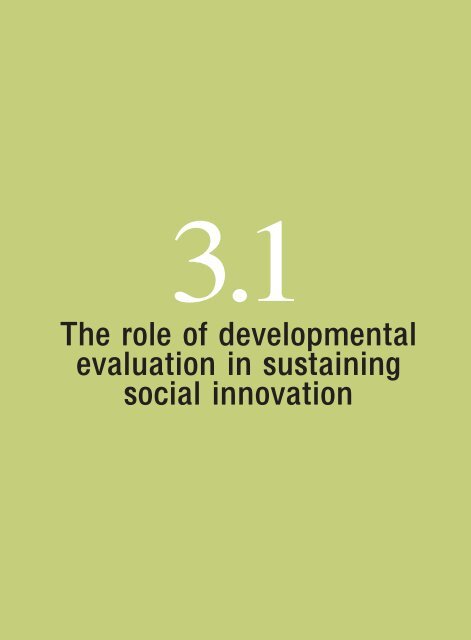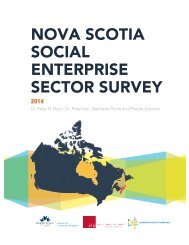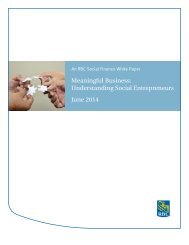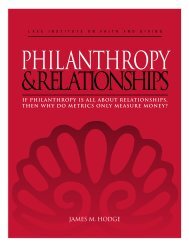Accelerating our Impact: Philanthropy, Innovation and Social Change
You also want an ePaper? Increase the reach of your titles
YUMPU automatically turns print PDFs into web optimized ePapers that Google loves.
<strong>Accelerating</strong> <strong>our</strong> <strong>Impact</strong>: <strong>Philanthropy</strong>, <strong>Innovation</strong> <strong>and</strong> <strong>Social</strong> <strong>Change</strong> The J.W. McConnell Family Foundation<br />
Evaluation is a particularly challenging dimension of innovation <strong>and</strong> social change<br />
initiatives. While the original innovation will require evidence of its applicability<br />
obtained through an impact evaluation before it can be replicated or “scaled up”,<br />
sustaining an innovation through the latter process requires a different approach. In<br />
both cases – during the creation of the initial innovation itself, <strong>and</strong> during the process<br />
of applying it in other locations or contexts – organizations may benefit from a<br />
developmental evaluation 29 . Traditional evaluation approaches that are imported too<br />
early into a process may constrain innovation. Evaluation is about critical thinking,<br />
while development is about creative thinking. Developmental evaluation is about<br />
holding these in balance. It is particularly suited therefore to the creation phase of a<br />
social innovation (from renewal <strong>and</strong> emergence through to birth in the ecocycle<br />
model described in Section I).<br />
The experienced American evaluator Michael Quinn Patton 30 suggests that developmental<br />
evaluation entails long-term, partnering relationships between evaluators<br />
<strong>and</strong> those engaged in innovative initiatives. The evaluator is part of a team whose<br />
members collaborate to conceptualize, design <strong>and</strong> test new approaches in a long-term,<br />
on-going process of continuous improvement, adaptation <strong>and</strong> intentional change.<br />
The evaluator’s primary function is to ask questions <strong>and</strong> gather data, as well as<br />
to facilitate assessments of where things are <strong>and</strong> how they are unfolding, what<br />
directions hold promise <strong>and</strong> which ones should be ab<strong>and</strong>oned, what new experiments<br />
should be tried, etc. Such feedback supports decision-making <strong>and</strong> c<strong>our</strong>se corrections.<br />
Developmental evaluation is a way to underst<strong>and</strong> innovation <strong>and</strong> growth, as well as a<br />
stimulant to the innovation process. Many social change leaders welcome being<br />
challenged, <strong>and</strong> it is the role of the developmental evaluator to find the natural places<br />
to ask probing questions such as: “Is this decision consistent with y<strong>our</strong> original goal?”<br />
<strong>and</strong> “Are you really being open to different perspectives?” At the same time, it does<br />
not replace other forms of evaluation. Rather, it serves as a complement during a<br />
particular phase of the innovation’s life cycle.<br />
When the Foundation decided to fund the national school-based environmental<br />
program Green Street 31 for a second five-year phase in 2004, it created an<br />
opportunity to reflect on how the program should be managed going forward.<br />
Areas identified for urgent attention included the nature of the (sometimes<br />
strained) relationships among the diverse program partners <strong>and</strong> the mechanisms<br />
for decision-making. The issues were complex, there was a range of at times<br />
contradictory perspectives, <strong>and</strong> it was difficult for participants in the process to<br />
have all of the information they needed to adequately assess the situation.<br />
Fortunately, Green Street had the assistance of a skillful evaluator who had been<br />
accompanying the program for several years. Equipped with developmental<br />
evaluation training, she documented the decision-making process from the<br />
perspective of multiple partners. In doing so, she identified a significant governance<br />
challenge <strong>and</strong> brought this information back to the group so that it could<br />
determine different options for Green Street’s future management. The evaluation<br />
process led to major changes in how the program is being run in the second<br />
phase. If Green Street had not had the assistance of a trusted developmental<br />
evaluator to guide it through this stage of its evolution, it is quite possible that the<br />
partners would have reached an impasse <strong>and</strong> a popular <strong>and</strong> innovative program<br />
would have been discontinued (one case where ‘creative destruction’ might not<br />
have resulted in re-emergence).<br />
A good developmental evaluation allows people to feel heard – the process of interviewing<br />
is a release valve for issues that may otherwise be blocking the initiative.<br />
Innovative environments are by their nature turbulent <strong>and</strong> often stressful. In skillful<br />
h<strong>and</strong>s, developmental evaluation acts as a form of coaching in constantly shifting<br />
environments.<br />
Developmental evaluation may therefore be particularly helpful to dissemination<br />
because it is more anticipatory than prescriptive. Traditional evaluation pushes for<br />
a high degree of internal validity (a tight experiment), which may be necessary in<br />
certain circumstances, but may constrain the adaptive capacity required for the<br />
adoption of complex approaches. In contrast, developmental evaluation lays out the<br />
issues <strong>and</strong> a range of potential responses, which is useful information for potential or<br />
actual program implementers. 32<br />
36<br />
29 With thanks to Jamie Gamble, developmental evaluator, Imprint Inc. (2006).<br />
30 Through the Sustaining <strong>Social</strong> <strong>Innovation</strong> initiative, the Foundation <strong>and</strong> DuPont Canada worked with<br />
Michael Quinn Patton on a training program in developmental evaluation, which was tested by 10 Canadian<br />
non-profit organizations. A report on the learning from that training can be found on the Foundation’s<br />
website (Jamie Gamble, “Emerging Learning about Developmental Evaluation”, May 2006).<br />
31 Green Street website < hhtp://www.green-street.ca > .<br />
32 Ibid.<br />
37







